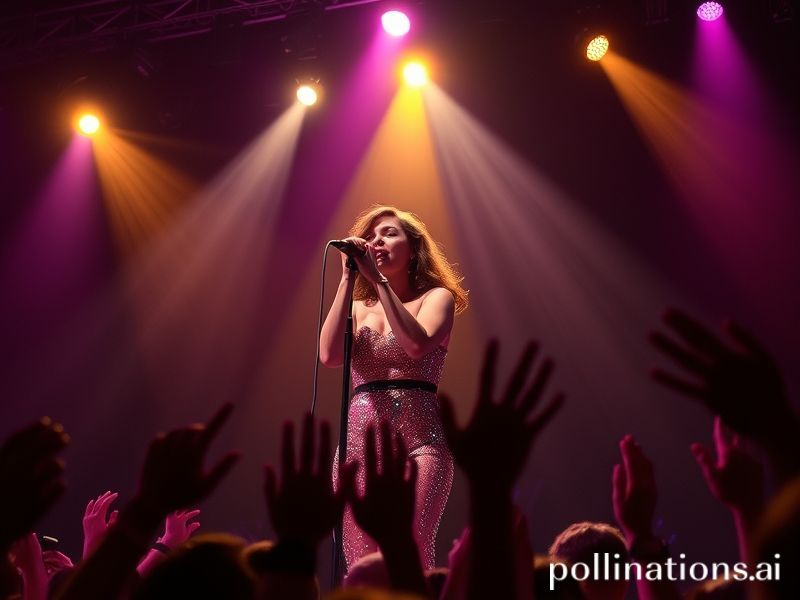Raye’s Planet-Spanning Tour Proves the World Is Still Emotionally Synchronised (Wi-Fi Permitting)
Raye’s world tour is the latest proof that a British woman with a laptop full of heartbreak and a TikTok algorithm can still make the planet shudder. In an age when most pop acts outsource their charisma to LED walls, Raye—born Rachel Keen, South London, classically trained, statistically underpaid until last year—has managed to stitch together five continents like she’s hemming a thrift-store coat. The numbers are almost vulgar: 47 dates from São Paulo to Seoul, tickets gone in the time it takes a hedge-fund algorithm to ruin a pension fund. If that sounds like hype, remember that hype is simply the market’s polite term for public hysteria.
Start in Latin America, where economies wobble like drunk uncles yet the kids still queue for six blocks in Bogotá to hear Raye run her tongue over “Escapism.” A cynic would say they’re buying two hours of amnesia from inflation running at 11 percent. A romantic would claim music is the last luxury good that doesn’t devalue. Both are correct, which is why the merch line stretches past the city’s last working ATM. Local promoters, fluent in IMF press releases, simply shrug: “We price in dollars, cry in pesos.” The tour’s carbon footprint, meanwhile, has already been baptized “medium” by a sustainability consultant who flew in business class to say so.
Hopscotch to Europe and the irony thickens like Brexit porridge. Raye sells out three nights at the Eventim Apollo in London—capacity 5,000—while the same government that once denied her artist visa funding now slaps her face on a VisitBritain campaign aimed at Chinese Gen-Zers who think Stonehenge is a K-pop group. In Berlin, her opening act samples the sound of U-Bahn doors closing; the crowd mistakes it for art. A lone pensioner outside waves a “Deutsche Musik Jetzt!” placard; he’s photographed, memed, forgotten. Raye herself tweets a photo of currywurst captioned “cultural exchange,” thereby solving European integration in 280 characters.
Asia greets her with the polite frenzy of societies that perfected crowd control during flu seasons. Tokyo’s venue staff bow deeper with each encroaching typhoon; in Seoul, fans synchronize lightsticks like a stock-trading floor. Streaming numbers spike across the continent as if someone whispered “sanctions” to the algorithm. Meanwhile, China’s firewall hums in contemplation: does a ballad about antidepressants count as subversive? The answer is classified, but the bootlegs leak anyway—proof that even authoritarianism can’t stop a minor chord in 3 a.m. headphones.
North America, bloated on superhero franchises and oat-milk lattes, pretends it discovered her. Los Angeles influencers pay $400 for resale tickets, then spend the concert filming themselves crying to “Worth It.” A Canadian diplomat smuggles a vinyl into the G7 summit as a gift for the French delegation; it ends up on eBay labeled “slightly tear-stained.” Ticketmaster’s dynamic pricing model achieves theoretical perfection when a single Toronto seat sells for the equivalent of a junior programmer’s annual bonus. Somewhere in Brooklyn, a think-tank fellow coins “griefflation” and applies for a grant.
Africa, routinely ignored by pop’s routing spreadsheets, gets two stops—Johannesburg and Lagos—because Raye’s Nigerian heritage finally became marketable after Grammy nominations. Local headlines oscillate between pride and suspicion: “Diaspora Darling Returns” versus “Another Londoner Mining Our Beats.” The shows sell out in 12 minutes; generator rental companies high-five in the dark. A Nairobi Uber driver streams the gig live while dodging potholes, proving that 4G is now a stronger colonial force than the Crown ever was.
What does it all mean? Simply that the planet is still capable of synchronized emotional seizures, provided the beat is right and the Wi-Fi holds. Raye’s tour is less a victory lap than a diagnostic scan: supply-chain fragility, currency volatility, algorithmic omniscience, and the human hunger for communal catharsis all lit up on one global MRI. The prognosis is mixed—climate collapse on the left, AI love songs on the right—but for two hours a night, the patient sings along. And if the encore ends with fireworks over a stadium whose naming rights belong to a cryptocurrency exchange no one will remember next year, well, that’s just late-stage capitalism humming the chorus it paid for.







